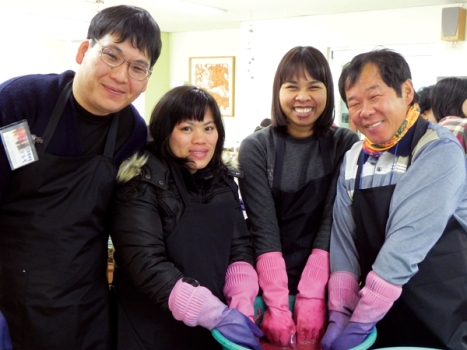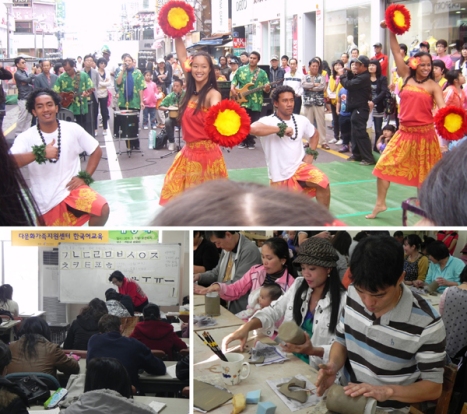My article reprinted from Jeju Weekly, April 22, 2011 issue.
International Jeju: Diversity and multicultural families
 ▲ Photos courtesy Jeju Multicultural Family Support Center
▲ Photos courtesy Jeju Multicultural Family Support Center
What does it mean to be a foreigner in Jeju? What if you’re a foreigner in a mixed marriage? What about the children of these families?
And what does it mean when Jeju’s government states its goal of becoming an “international city like Hong Kong or Singapore”?
Jeju is on a quest to develop a more diverse population by seeking foreign investors, actively marketing to Chinese second-home seekers, developing committees to meet the needs of multicultural families, and to better integrate the foreign population. These efforts also include building a global education city made up of foreign private schools that hope to attract foreign students, developing a healthcare town for foreigners seeking both short and long-term care, and more.
What that will mean to the remnants of Jeju’s traditional culture and to its current society remains in question.
Diversity is a complicated feature of any community. Generally welcomed as a positive factor, it nevertheless requires a great deal of patience and understanding, involves considerable frustration, and dramatically alters community bonds.
Jeju is no exception.
The island, with its indigenous cultural features evoking not only Korean but also Southeast Asian influence and the legacy of Mongolian, Chinese, and Japanese invasions, is no stranger to diversity, though understandably not always welcoming of it.
The cultural milieu of Jeju, however, is based at its core on a system known as “gwendang,” which includes family connections and village loyalties. While this system was naturally strengthened by the people’s resistance movements to each foreign invasion, it suffered a near-fatal blow during the 1948 massacre and subsequent years of war.
While this has resulted in a variety of social challenges, it has also prepared the way for Jeju’s present quest for diversity.
The current foreign population of Jeju is at 1.3 percent according to Immigration Ministry records. The number of immigrants by marriage is up 15 percent from last year and represents 23 percent of the total foreign population.
Presently, there are approximately 1,600 multicultural families. There are also more than 3,000 foreign workers and 800 foreign students.
Some Jeju men seek Southeast Asian brides. Some male foreign immigrants marry Jeju women. Mainlanders – though not “foreigners” per se – equal an estimated 50 percent of Jeju’s population.
Foreign professionals will soon be entering Jeju’s workforce in far greater numbers than ever before as a result of the Jeju Free International City Development Center’s core project, and similar economic ventures.
Diversity, it would seem, is here to stay – and about to increase significantly.
▲ Many of the activities on the island for Jeju’s foreign population, ranging from education to festivals, are sponsored by the Jeju Multicultural Family Support Center.
Enter the Multicultural Family Support Center, offices of which can be found throughout Korea.
The primary local facility is in Shin-Jeju and is sponsored by the central government’s Ministry of Gender Equality and Family as well as the Central Office for Multicultural Family Support Centers. It offers multiple services despite a low budget.
Regularly-offered programs include Korean language and cultural education, interpretation and translation, childcare, children’s education, counseling and employment support including vocational training and job placement.
In addition, there are specialized programs such as on-site tutoring for those who live far from the center. The organization also annually sponsors three large multicultural festivals which are well-attended by Jeju’s populace.
Director Kim Jeong Woo is realistic about the needs of foreigners and multicultural families, though he maintains a positive outlook.
“With our language instruction program, for example,” he explained, “we would like for people to attend long enough to achieve a high level of proficiency so that they can better integrate into Jeju society and obtain a higher-paying job.”
“But most quit after the basic level and take lower-paying work,” he sighed.
The needs of multicultural families vary. Language and cultural instruction are primary, and a lack of communication within the marriage tends to lead to marital conflict which may include domestic abuse and divorce, according to Kim. Isolation of foreign spouses who are not in the workforce and some prejudice which still exists in the local community, are other concerns.
“Cultural and linguistic ignorance and lack of support make integration difficult,” Kim said.
In addition to language instruction programs, the center provides interpretation services. Currently on staff are interpreters of Chinese, Vietnamese, Thai, Japanese, Russian, and Cambodian as well as English speakers. Volunteers are available for other languages.
The budget is an ongoing concern for the center. It receives funding from both the central and provincial governments as well as private donations, but there is always a greater need.
The office space is currently donated by a private individual, but in two years it will no longer be available, and the provincial government has not provided office space or rent to date.
Several private organizations such as the small agencies located in Donam-dong and Hagwi-ri also provide services for multicultural families. The YWCA in Shin-Jeju offers a number of related programs as well.
Jeju Provincial Government has recently formed a committee to address the needs of these families. As the committee is new, it has not yet taken action, but will begin its work in the near future.
Director Kim is a member of this new committee. So are YWCA President Shin Gyeong In, Councilwoman Lee Sunhwa, and others.
Kim had these recommendations for the committee: (1) the government must provide more funding for such programs in order to be considered an “international city” (2) a new immigrant/multicultural center should be built and (3) educational programs regarding the benefits of diversity should be offered by the media, in the schools, and to public officials as well in order that Jeju’s society might become more open in the future.
Korean language classes at the Multicultural Services Center are offered at all levels and open to all foreigners, not just those from multicultural families. They are free of charge. For more information and a schedule of classes, call: (064) 712-1603 or check their Web site: www.jejumc.net.
(Interpretation by Koh Yu Kyung)
Filed under: Articles written by Dr Hilty [published], Culture(s), Health and Well-being, Jeju Island, Women’s Issues
![]()

Dr. Anne Hilty is a Cultural Health Psychologist with a focus on the interplay of Eastern and Western theories of mental health as well as the mind-body connection. Her grounding is in the fields of cultural, transpersonal, and health psychology; she is additionally influenced by classical Chinese medicine, somatic psychology, and Asian shamanic traditions. Originally from the city of New York, Dr. Hilty lives on bucolic Jeju Island in South Korea, having previously lived in Seoul and Hong Kong.









